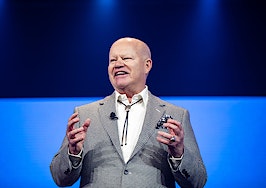Kick off fall with Branding and Marketing month at Inman. We’re going deep on agent branding and best practices for spending with Zillow, realtor.com and more. Top marketing executives drop by to share their newest tactics, too. It’s all you need to take your branding and marketing game to the next level.
You see the signs of a strong real estate brand all over Instagram: colors and logos, a specific type of post and a general sense of what a visitor to the page can expect.
While the idea of starting a brand can feel intimidating for new agents (or agents who are bringing in good business and don’t feel like they need to do anything extra), this type of consistency across social media platforms has been shown to be crucial for agents who want to elevate their work to the next level.
A year after breaking away from Nest Seekers and launching his own brokerage, Ryan Serhant has spent the last 12 months both building out a new brand and helping the agents on his team develop theirs. For Inman’s Branding and Marketing Month, he gave us his top tips for creating a personal brand that will serve as both your marketing and your lead generation.
“Whether you’re a new agent or a veteran agent, your whole life is about generating business,” Serhant said. “You can run around all day and knock on doors or send out mailers or you can work on your brand.”

Ryan Serhant | Photo credit: Nest Seekers International
Figure out your “core”
It may sound like a buzzword but any strong brand needs to start with understanding what sets you apart from other agents. Are you the funny one at the office? Do you work in a small or unusual market? Do you like to bake?
When trying to nail that down for members of his team, Serhant discovered that a new agent who described herself as “nothing special” was knee-deep into planning a dream wedding. Her new brand is now the agent helping newlyweds looking for homes.
“No one is just a real estate agent,” Serhant said. “You have a life, you have a personality, you have habits and you have characteristics. The thing that makes you uniquely you could be anything from the fact that you love to cook to the fact that you love dogs to the fact that you’re about to be a newlywed bride.”
Run with it
Once you’ve settled on a niche, take it as far as you can — get good photographs and write regular posts tailored specifically to that audience. Do not worry about appearing over-the-top or pushing your niche (for example, the “newlywed agent”) too far because, without that distinct quirk, it will be much harder to differentiate yourself from a million other agents.
“I have always believed in the power of PR,” Serhant said. “If you’re going to make a small investment into your brand, create a great website and have great marketing collateral but then also hire a publicist so that you have somebody who can speak about your brand for you while you’re out doing your business.”
…But still keep it real estate-focused
Even a two-minute glance through Instagram will show which agents have a personal brand and which have a personal profile in which they occasionally mention real estate. While family and pets can make an occasional appearance, the core messaging needs to be unequivocally and obviously real estate in order to keep hammering home what you can offer interested buyers.
“You want people to know you as the one who sells real estate for a reason,” Serhant said. “If you’re not reminding them of that and you’re not connecting that real estate to your brand, then why would anyone remember you?”
Work with your brokerage
While they have more freedom, independent agents also can have it harder because they have to start from scratch; those who are part of a large brokerage like RE/MAX or Compass have access to a social media team and a worked-out brand.
Working with your team or observing how a large company does their branding can be very helpful in figuring out what you need to do to get engagement.
“The big brokerage can give that launching point that individually might be very hard to reach,” he said.
Be ready to change your brand
While consistency is key, that does not mean you have to stick to an image of yourself that you no longer identify with or that is not serving you. The fact that you might grow tired of your brand next year should not stop you from picking a niche and trying it now — whether by slowly introducing new elements or announcing an official rebranding.
“Nike was once known for basketball shoes and running shoes only and now it is known as an apparel brand,” Serhant said. “If you look at any brand, you’ll see how it adapted to stay flexible. I think that is exactly what makes a brand long-lasting.”













